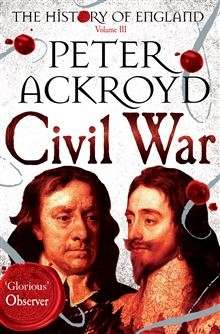Civil War
The History of England

Editorial Pan
Fecha de edición mayo 2015 · Edición nº 1
Idioma inglés
EAN 9781447271697
512 páginas
Libro
encuadernado en tapa blanda
Volúmen III
Resumen del libro
In Civil War, Peter Ackroyd continues his dazzling account of England's history, beginning with the progress south of the Scottish king, James VI, who on the death of Elizabeth I became the first Stuart king of England, and ends with the deposition and flight into exile of his grandson, James II. The Stuart dynasty brought together the two nations of England and Scotland into one realm, albeit a realm still marked by political divisions that echo to this day. More importantly, perhaps, the Stuart era was marked by the cruel depredations of civil war, and the killing of a king.
Ackroyd paints a vivid portrait of James I and his heirs. Shrewd and opinionated, the new King was eloquent on matters as diverse as theology, witchcraft and the abuses of tobacco, but his attitude to the English parliament sowed the seeds of the division that would split the country in the reign of his hapless heir, Charles I. Ackroyd offers a brilliant - warts and all - portrayal of Charles's nemesis Oliver Cromwell, Parliament's great military leader and England's only dictator, who began his career as a political liberator but ended it as much of a despot as 'that man of blood', the king he executed.
England's turbulent seventeenth century is vividly laid out before us, but so too is the cultural and social life of the period, notable for its extraordinarily rich literature, including Shakespeare's late masterpieces, Jacobean tragedy, the poetry of John Donne and Milton and Thomas Hobbes' great philosophical treatise, Leviathan. Civil War also gives us a very real sense of the lives of ordinary English men and women, lived out against a backdrop of constant disruption and uncertainty.
Biografía del autor
Nació el 5 de octubre de 1949 en Londres. Novelista y biógrafo conocido por su interés en la historia y cultura londinense. Ackroyd inició su carrera escribiendo poesía con poemarios como London Lickpenny (1973) y The Diversions of Purley (1987). Posteriormente, empezó a componer trabajos de ficción y obtuvo gran éxito, ganando el James Tait Black Memorial Prize en 1998 por la biografía Tomás Moro. Entre 1973 y 1977, Ackroyd trabajó en la revista The Spectator y a partir de 1978 ocupó el cargo de editor adjunto. En 1982, publicó The Great Fire of London, su primera novela. Esta fue la primera novela en una serie de obras sobre Londres, en la cual Ackroyd explora la naturaleza cambiante de la ciudad. Este tema es explorado a través de los artistas de la ciudad, especialmente de los escritores: Oscar Wilde en El último testamento de Oscar Wilde (1983); Nicholas Hawksmoor, Christopher Wren y John Vanbrugh en Hawksmoor (1985); Thomas Chatterton y George Gissing en Chatterton (1987); John Dee en The House of Dr Dee (1993); Dan Leno, Karl Marx y Thomas de Quincey en Dan Leno and the Limehouse Golem (1994); John Milton en Milton in America (1996); y Charles Lamb en The Lambs of London. Entre 2003 y 2005 escribió una serie de seis libros de no ficción para niños llamada Voyages Through Time. La serie es una extensa narrativa de periodos claves de la historia y fue aclamada por la crítica. En 1984 estuvo nominado para ser un Fellow de la Royal Society of Literature. En 2003 fue nombrado Comandante de la Orden del Imperio Británico.







